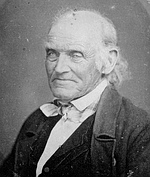The Gesner Diaries: A Project For A Lifetime
Our Palisades library holds a little-known treasure: the 1600 hand-written pages of Nicholas Gesnerʼs diary, set down between 1829 and 1850. Nicholas, born in 1765, lived his whole life in Palisades. He experienced the Revolutionary War, saw Major André hung in Tappan, and made his living here as a shipbuilder, farmer, schoolteacher, lawyer, and surveyor. His diary, which is written in a crabbed hand writing with many cryptic abbreviations, has never been transcribed but is full of interesting details about his neighbors and about early life in Palisades.
It was Winthrop Gilman, our indefatigable early historian, who in 1898 persuaded Mrs. Julia Denike to give him the fifty five sections of the diary, which had come down in her family. Gilman gave them to the Palisades Library, where my mother Alice Haagensen found them in 1941 when she helped to move the library from the Big House to the Community Center where it was located for a few years. Alice found the diaries fascinating and conceived the idea of transcribing and publishing the whole thing. She worked on the diary, with the help of friends, for many years but eventually gave it up after she went to a nursing home at the age of 100.
I had been resisting the idea of completing her work because it seemed like such an impossibly laborious undertaking. But in January of this year, I decided to give it a try and see how difficult it was. I had the 400 pages she had already transcribed as a start, alhough each one had to be checked and typed on the computer. Once I had begun, I, too, found it fascinating. I am up to page 450 and plan to translate and type all 1600 pages in the next couple of years. Working on it is like reading a long novel; I can now identify most of the characters that appear in the diary and can follow the dramas and controversies that Nicholas, who writes fluently and often emotionally, describes in his daily record.
Here is an example of the kind of thing he records, written on June 15, 1833. Jake was Nicholasʼs son who suffered often from a pain in his side.
“A pretended Botanist and Stranger passed my door to Day, pretended to cure Rheumatism and also the fever and Ague in 13 or 14 Hours and never to have it again. Also the Salt Rheumatism, the tooth ache in 2 Minutes with many other complaints. His upper lip was unshorn, had on it long hair. Said he had been educated a Regular bred physician in France, had been in Canada as much as 15 or 16 years Among the Indians there and had acquired a Knowledge of Botanical Medicine. I fancy his long lip beard was a Stratagem to make people believe he knew something and he could speak well; but instead of French I think he is Irish by his tongue. I got a plaister of him for Jake 4 shillings. A man with him who carried his medicine.”
And on April 1, 1831, Nicholas wrote the following:
“This Day we had correct information that Jacob Conklin Died, being ill about 3 only Hours. Died yesterday about 9 o’clock AM. It is also Related that Elmira, his unlawful Wife, a few Days Ago while Jacob Concklin was up at Rockland went to be Married Again. The Carriage overset, and she broke her arm, which interrupted this Beastly Woman from performing this act. Applied to a Doctor, who knew her Design (it is said) told her she must go somewhere else — he would not set it &c. This is now Reported. But the poor Mortified man is Dead, supposed with the Cholera. But Circumstances present to the Mind the question: Don’t you think perhaps a Dose of Laudanum or poison has been taken, or Given him. This man was the most deplorable victim of mortifying affection for a Beastly Woman, an unclean Strumpet (so said) that ever was &c. She proved a total destruction to him, his peace, his constitution by drinking and harassing him, sold his property last May, and she had consumed nearly all. He was married to her and she had a husband living, no divorce, a Stinking beast.”
Nicholas writes about religious dissension in the neighborhood (there were two Methodist sects and each distrusted the other), local scandals, illnesses, deaths, births, weddings, steamboat accidents, how much money he borrowed, lent and spent, and many other subjects. He records the weather each day and describes the work he did on the farm. The diaries are a treasure trove of information for historical researchers.
I look forward to reading the next eleven hundred pages. It is the closest I will ever get to the Palisades of 180 years ago, and in the process Nicholas Gesner is becoming very real to me, a difficult but admirable character whose life story I am following day by day.


